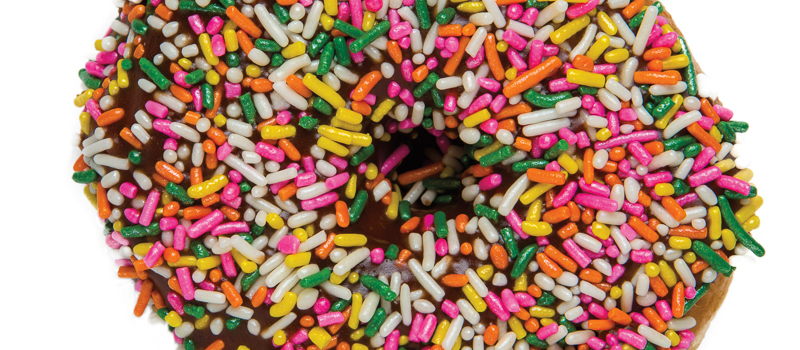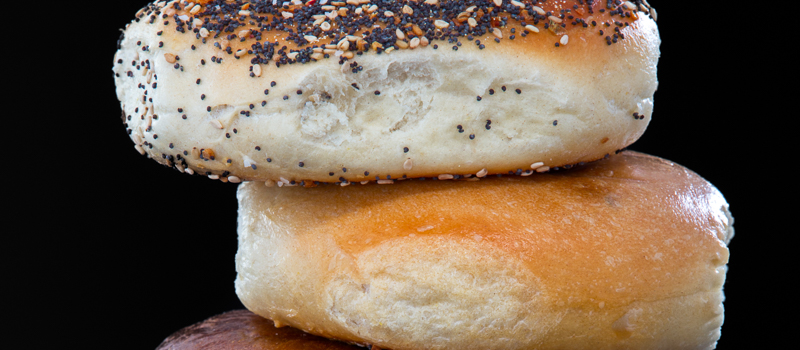So similar, yet worlds apart, the bagel and the donut—staples both of the breakfast scene—were destined to become enemies. Any likeness relegated to the superficial, each represents a starkly different approach to the morning meal, a culinary ideology at odds with its opponent. It’s a fire that runs deep, like the unquenchable flame of a blood feud, unreached by reason and unassuaged by the passage of time. The Bagelonians stand proud proponents of their chewy, doughy avatar, a morning meal that dares to demand of its consumer some mandibular effort and preparation, a microcosmic reminder of the world one is about to enter. Opposed, the Donutians raise their standard under the soft and sweet sigil of a saccharine savior, emerging into the hustle and bustle of the day comfortably crumbed. As this edible arms race reaches its inevitable and absurd apex, with bagels drizzled in syrups and sprinkles like charlatan donuts and donuts staging a ham-fisted reinvention as sandwich stackers, two champions rise to bring it back to the basics and remind everyone what they’re fighting for—and that the cronut is totally not a thing.

PHOTO BY WYATT KOSTYGAN.
BRADENTON DONUTS
Stepping into Bradenton Donuts feels like revisiting the Golden Age of diners and donuts, with its gleaming counter and stool setup unchanged since 1965, a place where regulars post up with the morning paper, drinking black coffee from a white mug, the day’s donut saucered nearby. More than an old-school feel, owners Pei He and Jinny Huang, who go simply by Peter and Jinny, promise donuts the old-fashioned way as well, baking with potato flour as opposed to the ubiquitous enriched wheat flour, resulting in a fluffier product with a sweet subtlety lost in most mass-produced options. “Once you taste it, you’ll know the difference,” says Huang. Made fresh every day, the selection has more to do with the clientele than it does the taste of the chef, with the owners keeping track of who comes in when, and what they typically want. Family-run, Bradenton Donuts is almost family-supported, with its array of loyal regulars. “We take care of our customers and they’re like family,” says Huang, while one interrupts from a seat by the window “You make the best sour cream [donut] in town.” The sour cream donut is a favorite, Huang says, but is probably outsold by the classic glazed (infused with that subtle potato flavor), the Boston cream donut and the potato flour Apple Fritter, made with real chopped apples, a healthy dose of cinnamon and a honey glaze for a simple classic. The apple fritter travels the most, with snowbirds shipping dozens as far north as Canada.

A two-person operation, daily stock is limited, with the pair typically making one assorted batch per day, its contents dictated by what regulars are expected that day as well as general trends in popularity. In-season, two batches a day becomes the norm. “We make a little bit,” says Huang, “but we take care.”
LOX AND EGG BREAD COMPANY
Trucking a bit farther south down Tamiami Trail, Lox and Egg Bread Company barrels ahead with full steam, where baker Derek Krzypkowski and his assistant Chuck put in the work to make bagels the old-fashioned way, which means boiling them. Einstein Bagels down the street is closed for remodeling, sending bagel-hungry hordes into the shop, so Krzypkowski has no time to sit but is more than willing to talk while he works.
Beginning with a great slab of dough lumping over a steel tray like a topographic relief, Krzypkowski slices away thick sticky strips to start the process. As any chef will tell you, ingredients are key, and bagels at Lox and Egg are no exception, made from scratch every day using clean and simple ingredients. Krzypkowski adds little to his bagels throughout the process, instead opting to allow the pure flavor of the flour itself work its charm. “We don’t want to kill the flavor of the flour with a bunch of crazy ingredients,” says Krzypkowski. “You have to be very delicate.”
Likewise, he shuns any chemical additives or dough conditioners, which he says are in vogue at the moment as flavor enhancers. “We don’t want to do that,” says Krzypkowski. “We want this to be all-natural.” The strips of dough run through a two-step machine that divides the dough into smaller, rounded lengths and then wraps these into rings. Krzypkowski stands watch at the middle, eyeballing the dough, adding and removing clumps to ensure each is the proper amount before moving on.
Traditionally the bagels are boiled at this point, but most mass-production operations skip this step, says Krzypkowski, simply spraying the bagels down and sending them straight to the oven. But the boil is essential to the magic of the bagel, creating a crisp crust around the chewy interior, making a more dynamic eating experience and longer-lasting product. “Very few places are still doing this in the United States because it’s such a long process,” says Krzypkowski, “but a bagel like this will stay fresh all day.” Formerly a longtime manager at an area Dunkin’ Donuts, Krzypkowski can claim veteran status in this victuals vendetta and it’s with these war-weary eyes he makes his proclamation. “Donuts are not the future,” he says matter-of-factly. “Up north it’s still going well, here it’s too hot.” Huang’s only reply: “Who doesn’t like donuts?”










